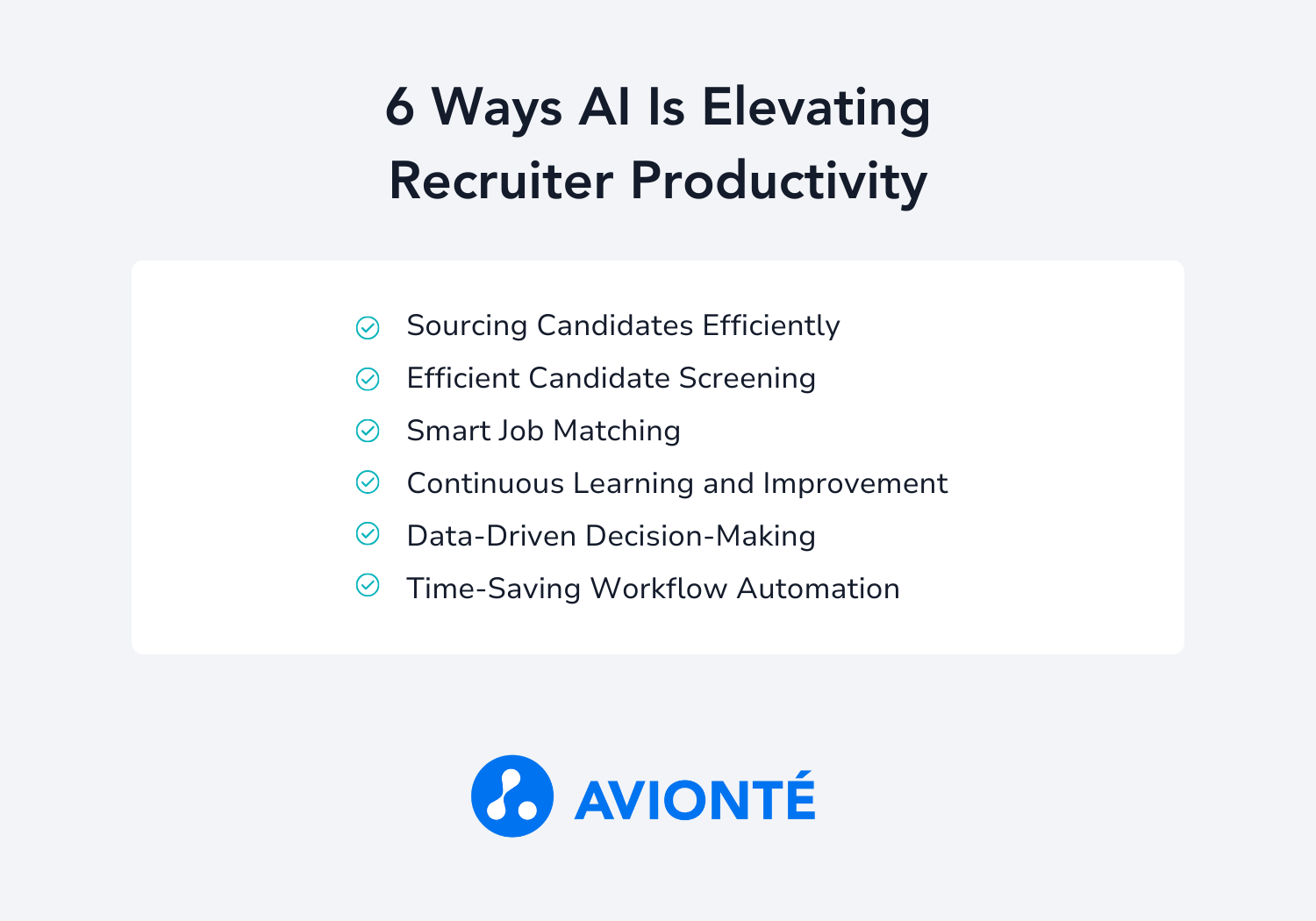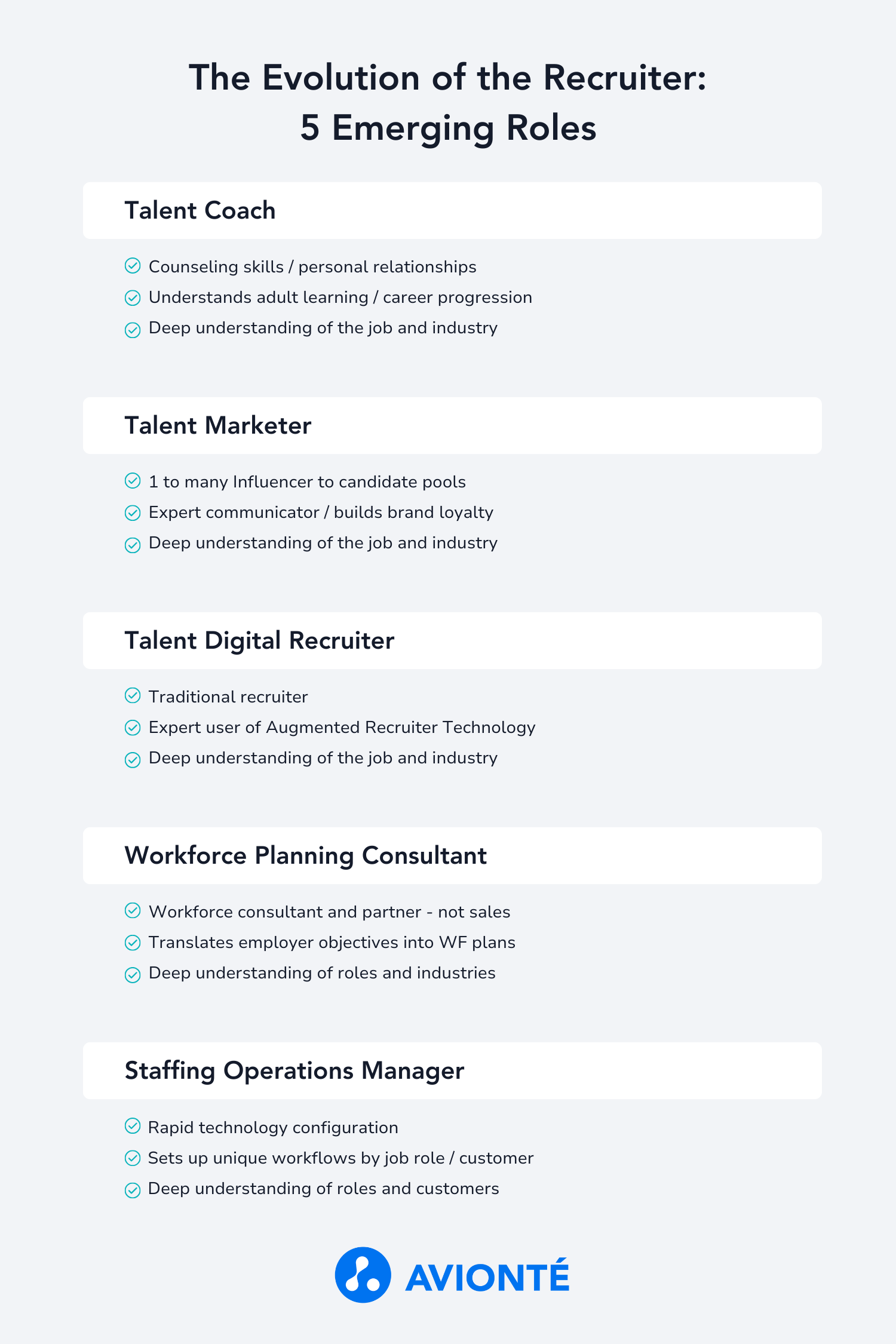
Expand Your Talent Pool: Transform Your Business with Avionté+ Open API Program
Learn about our groundbreaking open API program designed to revolutionize the way agencies operate.
The age of artificial intelligence is here, and it’s already transforming the way we live, communicate, shop, and – most importantly – even the way we work. In today’s fast-paced recruiting landscape, it’s important to understand how AI is changing the role of the recruiter. Industry experts agree that AI will significantly change the role of recruiter without replacing the need for a human element in recruiting.

With the deep integration of AI and automation tools into staffing platforms, recruiters are at the forefront of a revolution that promises heightened efficiency, an improved candidate experience, and a fundamental shift in traditional responsibilities. In fact, many of the administrative tasks that once took hours can now be accomplished in minutes, thanks to the transformative power of artificial intelligence. Industry experts estimate that 39% of staffing industry tasks will be replaced by AI.
And the benefits of these advanced tools extend far beyond mere time savings. By automating conventional recruitment processes, recruiters can redirect their focus toward tasks demanding human intuition, empathy, and strategic thinking. This transformative shift allows recruiters to fill more job orders, source a larger pool of candidates, and effectively manage talent.
But many in the industry still worry: will automation and robots replace the role of the recruiter? The answer is a resounding no. In this new era, the human-centric touch becomes even more indispensable, ensuring the competitiveness of your agency. However, the implications are crystal clear: adapt swiftly to automation and AI, or risk being left behind by those who do.
As Tom Erb described in the Avionté: Digital Edge podcast, Are Robots Coming for My Job: The Future of Recruiting:
“If we look at what recruiters do on a day-to-day basis, many of them are at risk of their job being done by just regular workflow automation. The stuff that’s easier to do, that’s going to be done through automation. But the more nuanced, skilled stuff is going to be done by highly skilled recruiters. And that’s what we’re going to see more and more. So, will good recruiters be replaced by AI? Absolutely not.”
As AI becomes deeply integrated with staffing platforms, the tools at a recruiter’s disposal are evolving to offer unprecedented support. Here are several ways in which AI and automation enhance recruiter productivity.

AI is a game-changer for your recruitment strategy. By leveraging AI-powered tools, recruiters can access vast databases and online platforms to identify potential candidates who match specific job requirements. AI algorithms analyze job descriptions and candidate profiles, helping recruiters find the best candidates for a specific role. This not only expands the talent pool with quality candidates but also increases the chances of finding the perfect match for a job opening.
AI-driven tools automate the initial stages of candidate screening by analyzing resumes, identifying relevant skills, and assessing qualifications. Chatbots can engage with candidates through messaging platforms by conducting pre-screening interviews, scheduling initial interviews, and providing recruiters with a shortlist of the most relevant candidates. The use of AI-driven tools significantly accelerates the screening process and ensures a more precise match. This allows recruiters to focus on more complex tasks while ensuring candidates receive timely responses and information.
Your talent database is full of potential candidates, but sometimes finding the right candidate can feel like searching for a needle in a haystack. AI-driven algorithms analyze candidate profiles and job requirements to make intelligent matches, and it can analyze historical data and identify patterns related to successful hires. With the assistance of AI, your recruiters can fully optimize your existing talent database. This also means that candidates are presented with opportunities that align with their skills and experience, increasing their engagement with potential job openings and improving the likelihood of finding the right fit. This personalized approach demonstrates the staffing firm’s commitment to understanding and meeting the unique needs of each candidate.
AI continuously learns from candidate interactions and feedback, allowing staffing firms to refine their processes. This iterative approach ensures that the candidate experience evolves and improves over time, addressing pain points and delivering a more responsive and adaptive service.
Technology solutions have left many businesses drowning in data. With AI-backed data analytics tools, your recruiters can have valuable insights into key business trends. Recruiters can make informed decisions by knowing candidate behavior, market demands, and client preferences. This enables recruiters to make decisions that align with the evolving needs of your business and the staffing industry.
AI can also assist with DEI initiatives by identifying and addressing biases in recruitment processes. AI tools analyze data to identify areas for improving diversity in hiring, making the process fairer and more equitable.
Automation streamlines repetitive and time-consuming tasks, such as scheduling interviews, sending onboarding task reminders, and managing documentation. This allows recruiters to focus more time on building relationships and interacting with clients. It also enables them to prioritize important tasks that contribute to the success of the staffing firm. This convenience not only saves time for candidates, but also contributes to a positive impression of the staffing firm as tech-savvy and responsive to candidates’ and clients’ needs.
The shift towards AI and automation offers recruiters both challenges and unmatched opportunities. As mundane tasks are fading away, replaced by a new era where recruiters will now have greater ability to renew focus on the more strategic, human-centric aspects of their job, the role of the recruiter will need to adapt as quickly as the technology that is shaping it.

As recruiters adapt to the changing landscape, new, more specialized roles are set to emerge, reflecting the diverse skills required in this AI-driven era. Here are five potential positions likely to surface in this evolving landscape.
In a future AI-powered recruitment realm, Talent Coaches may emerge to play a vital role in guiding individuals through career coaching, talent reskilling, and life skill development. Armed with counseling skills, an understanding of adult learning, and profound industry knowledge, they could serve as mentors, assisting individuals in navigating the intricacies of career progression.
As technology reshapes candidate engagement, Talent Marketers may emerge as brand ambassadors and masters of talent communications. Their role could involve crafting compelling narratives to attract and influence candidates. With a deep understanding of both the job and industry, they would work on communication and marketing strategies to influence several talent pools and build brand loyalty.
At the forefront of technological advancements, Talent Digital Recruiters could specialize in curating, managing, analyzing, and maximizing the value of talent pools. Their expertise in utilizing Augmented Recruiter Technology could set them apart, allowing them to navigate the digital landscape with precision, guided by a deep understanding of the industry.
In an AI-driven recruitment ecosystem, Staffing Operations Managers might serve as the linchpin in configuring and delivering end-to-end workflows. Their proficiency in rapid technology configuration could shine as they set up unique workflows tailored to specific job tasks and customers. This role could demand a deep understanding of diverse occupations and customer dynamics, ensuring seamless integration with evolving technologies.
With employers seeking more strategic workforce planning, Workforce Planning Consultants may emerge as invaluable workforce partners. Operating independently of a sales-centric approach, they could facilitate demand planning, translating employer objectives into comprehensive workforce plans. This role might require a deep understanding of various roles and industries, contributing to effective talent management strategies in the age of AI.

In the era of artificial intelligence, the recruitment landscape is undergoing a profound transformation, and recruiters are at the forefront of this revolution. The integration of AI and automation tools is not replacing recruiters; instead, it is reshaping their role and offering unparalleled opportunities for increased efficiency and improved candidate engagement. As administrative tasks dwindle, recruiters are freed to focus on strategic, human-centric aspects of their work, filling more job orders, sourcing a broader pool of candidates, and managing talent more effectively.
The future belongs to recruiters who embrace AI, recognizing the challenges and opportunities it presents, and who navigate the changing currents of the recruitment landscape with a blend of human expertise and technological prowess. As the staffing industry undergoes radical transformation, recruiters poised for this evolution will lead the way, shaping the future of recruitment.
Want to see how a modern staffing platform can transform your staffing business and give you an edge above the competition? Schedule a free consultation call today.